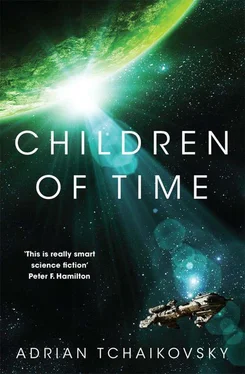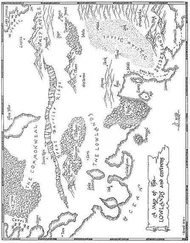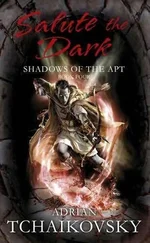Holsten realized unhappily that his own moral compass was spinning by now. ‘Lain thinks you’ll wreck the Gil ’s systems, if you try that. She says there are copies of your test subjects running riot through the software.’
‘ I’m my own test subject,’ Guyen growled. ‘Anything in the system is just cast-offs of me . But none of them worked. None of them were me – not enough of me. But what little work I could squeeze out of you before you went gallivanting has served. Perhaps that’s irony. It’s ready now. I can complete an upload, and then it doesn’t matter if I die. When I die, it won’t matter. And as for Lain, Vitas doesn’t think it’ll destroy the computer. Vitas wants me to do it.’
On Holsten’s list of reassuring things to say, that phrase did not feature. ‘Lain seems pretty sure it’s going to be a bad thing.’
‘Lain doesn’t know. Lain thinks small; she lacks dedication.’ Guyen glowered, his face screwing up like a piece of paper. ‘Only I can plan long enough to save us, Mason. That’s why they chose me.’
Holsten stared up at him. The guards were some distance back, and it came to him that he could leap on decrepit old Guyen and just start pulling things out until nature took its course. And also that he had no intention of doing so.
‘Then why did you grab me back, if you didn’t need me?’
Guyen took a few stalking, mechanical steps, pulled up by the leash of his life-support. ‘You’re our star historian, aren’t you? Well, now you get to do the other part of your job, Mason. You get to write the histories. When they tell each other how we came to live on that green world, that other Earth, I want them to tell it right. So tell it right . Tell them what we did, Mason. Write it down. What we do here creates the future, the only possible future that will see our species survive.’
The spider city states operate a variety of mining concerns, but they themselves do not dig. They have insects for that: one of the tasks that comes more naturally to the ant colonies they use in so many different ways. For centuries there has been enough for all, since spider technology is not metal-heavy, and the organic chemicals more important to them are fabricated from the common building blocks of life itself.
This is where it starts.
An ant from a colony run by Seven Trees is now making its way deeper into a set of galleries at some distance from the city itself. Its colony extends all around it – the mine workings are its home, and its siblings’ excavations just a modified form of the same tunnelling they would use to expand their nest. True, much of the colony extends into solid rock, and the ants use modern techniques to conquer that element. Their mandibles are fitted with metal picks, assisted by a selection of acids and other substances to weaken the stone. The colony plans its own mine, including drainage and ventilation to make the place a conducive workplace for the hundreds of blind miners who toil there.
This particular ant is exploring for new seams of copper within the rock. The metal ore leaves traces that its sensitive antennae can detect, and it gnaws and works patiently where a trace is strongest, digging inch by inch towards the next deposit.
This time, instead, it suddenly breaks through into another tunnel.
There is a moment of baffled indecision as the digger teeters on the brink, trying to process this new and unexpected information. After that, scent and touch have built up a sufficient picture of its surroundings. The message is clear: other ants have been here recently, ants belonging to an unknown colony. Barring other conditioning, unknown colonies are enemies by default. The ant spreads the alarm immediately, and then goes forth to investigate. Soon enough it encounters the miners of the other colony and, outnumbered, is swiftly killed. No matter: its siblings are right behind it, summoned by its alert. A cramped, vicious fight takes place, with no quarter given by either side. Neither colony has received instructions from its spider masters to cross this particular line in the sand, but nature will take its course.
The second colony, that had literally undermined the Seven Trees workings, has been sent out by Great Nest to seek for new sources of copper. Shortly thereafter, centuries of diplomacy begin to break down.
Since contact with the Messenger was first established, metals consumption has increased exponentially in an attempt to keep up with the complex blueprints that form the Divine Plan. Those cities like Great Nest that are most fervent in pursuing God’s design must push outwards constantly. Supply cannot keep up with demand unless new mines are opened – or appropriated.
Consequently, more mining works are being contested between rival colonies. Elsewhere, caravans of mineral wealth fail to reach their proper destination. In a few cases entire mining colonies are uprooted, driven away or suborned. Those who lose out are all relatively small cities, and none of them strong adherents of the message. A storm of diplomacy follows, amidst considerable uncertainty as to what has actually happened. Open conflict between spider cities is almost unknown, since every city is bound to its neighbours by hundreds of ties. There are struggles for dominance but thus far in their history, the point has always been that there must be something to be dominant over. Perhaps it is due to the nanovirus still working towards unity between those that bear its particular mark of Cain. Perhaps it is simply that the descendants of Portia labiata have developed a worldview in which open brute conflict is best avoided.
All this will change.
Eventually, when the truth becomes sufficiently evident to all parties, the transmitters of Great Nest issue an ultimatum to its weaker neighbours. It denounces them as straying from the purity of the message, and claims for itself the right to take whatever steps it must, to put into effect the will of God. Transmissions from the Messenger, though always obscure and open to interpretation, are taken to endorse Great Nest’s proclamation. Slowly at first, and then more and more rapidly, this outright division spreads from local differences into a global fragmentation of ideology. Some faithful cities have thrown in their lot with Great Nest’s vision, whilst others – distant others – have set up rival claims based on different interpretations of the Messenger’s commands. Certain cities that had already begun to turn away from the message have pledged support to those cities that Great Nest has threatened, but those cities themselves are not united in their response. Other cities have declared independence and neutrality, some even severing all contact with the outside world. Sister conflicts have sparked up between states which perhaps have always rubbed along with a little too much friction, always jostling for leg room, for food, for living space.
At the disputed mining sites, many of which have changed hands several times by this point, Great Nest sends in dedicated troops. Another task that ant colonies will perform without special conditioning is to fight unfamiliar ants, and a mining colony is no match for an invading army column equipped with special castes and technologies. In two months of hard warfare, not a spider has died, but their insect servants have been slaughtered in their thousands.
Great Nest can draw upon a vastly larger and more coordinated army than its opponents and one that is better designed and bred for war, but those first months are still inconclusive. When Portia and her fellows gather together to review their progress, they are faced with an unwanted revelation.
We had thought to find matters settled , Portia considers, listening to her peers weave together their next moves: a sequence of steps that will lead them to… where? When the original actions over the disputed mining sites were agreed, their purpose had seemed very plain. They all knew they were in the right. The Messenger’s will must be done, and they needed copper in great quantities – copper that Seven Trees and the other apostate cities would have little use for, save to trade to Great Nest at a ruinous cost. So: seize the mines; that had been a simple aim in itself, and it has been accomplished relatively quickly and efficiently, all things considered.
Читать дальше












